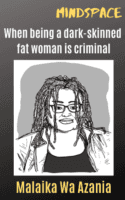“I am sorry, but we do not have sizes for you here.”
I remember this day like it was yesterday. I was a teenager and like all other children my age, I was in the habit of walking around malls window-shopping. This day was one of the few rare occasions in my childhood that I had money to spend, so I bounced happily into one of the biggest retail stores at Westgate Mall and enquired about jeans that were fashionable at the time. Frustrated that I could find nothing in my size, I called the sales assistant over to ask for help. She glanced at me with a look of bewilderment – and something resembling contempt – as though stunned by my request. Without pausing to contemplate what the impact of what she would say next could be to a teenage girl, she posited: “I am sorry, but we do not have sizes for you here.”
I have never been slim by any stretch of the imagination. I was always the chubby one in class and certainly the biggest among my friends. But it was not something I paid great attention to – until that afternoon when I was made acutely aware that I was fat, and that certain spaces in our country did not accommodate people like me. “We do not have sizes for you here” meant that there was a space in South Africa where I did not belong and where my presence was a source of discomfort for those who could lay legitimate claim to an existence I had no rights to claim.
Shortly after this experience, another occurred that impacted greatly on my already battered self-image. I had just moved from my school in the township of Soweto to a multi-racial school in the northern suburbs of Johannesburg. I had dreadlocks. I loved them deeply and took care of them well. One day I was called into the principal’s office and was told that I needed to cut my dreadlocks because they did not look “neat”. I did cut them, because we went to these schools at a time when few Black children were standing up to authority and demanding their rightful place in schools that refused to recognise their humanity. But that experience impacted greatly not only on my politics, but also on the way I saw myself as a young person who was already self-conscious about her weight following the incident at Westgate Mall. Throughout my teenage years, comments would often be made about my skin tone, often that I would be more beautiful if I were lighter. It became very clear to me that to be a dark-skinned fat young woman with dreadlocks was a criminal offence.
The media and other agencies of socialisation re-enforced this belief. I grew up reading magazines that were constantly telling me that there was something not quite right about the size of my body – something that necessitated alteration. To this day, you cannot open a magazine without reading an article or two about the latest diet fad and the ways in which you can alter your body to become slimmer and to look lighter. It is not an accident of history that skin-lightening creams have become a multi-billion rand industry on the African continent and in the developing world where people of colour have been conditioned to believe that there is something deplorable about being dark-skinned. They are told that the solution to this is to apply harmful chemicals to their skin in order to attain a lighter complexion and therefore be deemed beautiful and acceptable. Young women across the world are putting their lives on the line in the quest to lose weight. Conditions like anorexia and bulimia nervosa are on the rise because teenagers are in pursuit of the body that magazines have told them is better. They are in the pursuit of being deemed acceptable, of belonging.
I am now a 28-year-old woman who has learned to love the body and the skin that she is in. While the fashion industry has evolved to reflect the diversity of women’s bodies, there are still moments when I walk into a store and do not find clothes for someone my size. But now, it does not hurt or offend me because I know that the real problem is not my weight, but a store that does not believe that women my size matter; that we too want to look sexy.
I am not advocating for women to not pursue healthy bodies. Rather, I am contending that being slim does not translate to being healthy, and conversely, being chubby does not translate to being unhealthy. Women need to learn to love the bodies and the skins that they are in, and this is something that should be inculcated from a young age. Little girls need to know that dark skin is beautiful skin, that afros and dreadlocks are beautiful hairstyles and that carrying extra kilos does not make them unattractive. The “perfect body” exists only in Photoshop and other such applications. In the real world, women have uneven skin tones, cellulite and stretchmarks. In the real world, women’s hair is not straightened, their bodies are not perfectly toned, and they have some fat around their stomachs. And you know what? They are beautiful and phenomenally, phenomenal women!
*Malaika is the bestselling author of Memoirs of a Born Free: Reflections on the Rainbow Nation and a Masters candidate in the Department of Geography at Rhodes University.
Tell us: Have you ever been made to feel bad about the way you look?
This blog also forms part of our Rights 2.0 – Bridging Divides project. Find out more here.


